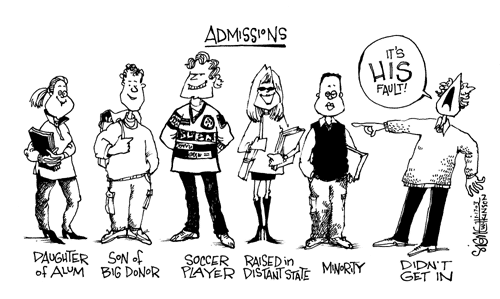
You’re walking down a dark street, alone, at night. You see a black man walking towards you; you tense up, avert your eyes and pick up the pace. At one point or another we have all been guilty of racial profiling. Yet many people are quick to say that racism is a thing of the past that ended with the civil war, civil rights movement, and the election of President Barack Obama. Racial prejudice still exists in our country, simply because it has been swept under the rug does not mean that it does not exist. In an article entitle “Why American Can’t Get Over Race,” the author presents the question if Americans have really changed at all since the days of slavery. “Any discussion of race or racism inevitably stirs uncomfortable reactions,” (Cohen 1) and until this discomfort is eradiated, there were always be racial prejudice.
For as long as Bigger Thomas, of Richard Wright’s Native Son, can remember he has been on the South Side of the city. Forced to live in the slums of Chicago, he has long looked out at the horizon of white mansions and longed for a better life. But he was a “negro” and because of this he is condemned to a life of poverty and servitude. Bigger cannot deny that he feels like a stranger in his own life; “we live here and they live there. We black and they white. They got things and we ain’t. They do things and we can’t. It’s just like living in jail. Half the time I feel like I’m on the outside of the world peeping in through a knothole in the fence,” (Wright 20). Bigger’s feelings are still very real in society today. “While Obama has moved the subject of prejudice out from the shadows, more than his exotic name, origin and religious affiliation are at issue. When Colin Powell, one of America's most accomplished military leaders and diplomats, contemplated running for the presidency in 2000, his family feared for his safety,” (Cohen 1) Everyday for Bigger and Obama is a battle for survival whether its on the streets or on the campaign trail.
Yet Native Son does not take place during the time of slavery, rather it is set in Chicago during the 1930s. A time not too long ago still had African Americans living segregated and subordinate lives. When confronted with this issue many people will say “That's all in the past, we had nothing to do with it. It's history. Get over it,” (Cohen 1) but that is exactly the attitude that tethers us to our racist past. Until Americans can “discuss the horrors of the enslavement, lynchings, segregation and degradation of African-Americans without prompting resentment or indifference,” we will never severe our ties with our racist past (Cohen 1).
Cohen, William S, and Janey Langhart Cohen. "Why Americans Can't Get Over Race."
CNN. 18 July 2008. 16 Mar. 2009
Wright, Richard. Native Son. New York: Harper Perennial , 1940.
